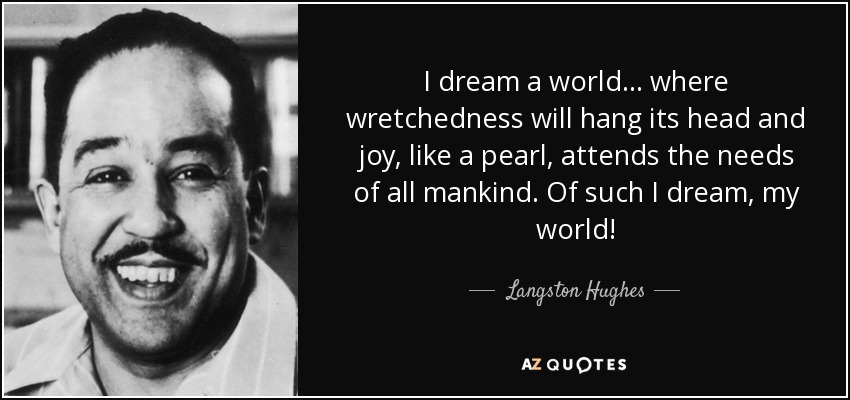Honoring Langston Hughes’ vision

The following is the preamble to the December 2015 “I Dream a World” concert program
“And this shall be our reply to violence, to make music even more intensely, more beautifully, more devotedly than ever before.” —Leonard Bernstein
Langston Hughes, the influential poet and leader of the Harlem Renaissance, envisioned a world where love reigns, uniting peoples of different cultures and beliefs. Hughes’ poem Tired says:
I am so tired of waiting,
Aren’t you,
For the world to become good
And beautiful and kind?
Many of the world’s cultures and religions affirm love’s power to connect people through a spirit of compassion. This concert seeks to explore some of these traditions, honoring this hope-filled holiday period, when we rejoice in good news and pray for peace on earth.
We begin with the rousing invitation to Strike Up Your Instruments of Joy, written to celebrate Christmas. The traditional Christian birth story leads the way into songs of angels and the New Year. This includes a set of seasonal music presented by Ragazzi Premiere on December 5, alternating with Avanti group on December 6.
We move to the Jewish tradition with two celebratory songs of praise, exhorting us to sing (Shiru)! Returning to Christian tradition, Johann Sebastian Bach’s Domine Deus, taken from the Lutheran Mass in G Major, prays for mercy to be shown to all God’s people. Renaissance English composer William Byrd’s contrapuntal Haec Dies weaves together 6 parts, echoing the text in imitation until the piece explodes in a long Alleluia. A traditional Sufi melody, Adinu, expresses fervent prayer and devotion. It introduces music from the Arabic tradition, including improvisation and quarter tones (a smaller scale interval than the Western half-step).
From Finland comes a playful story about a little boy’s attempts to assemble a chorus from his uncooperative animal friends. The simple melody is enhanced by brilliant and virtuosic piano accompaniment. Historic Christian music continues with two plainchants, followed by Felix Mendelssohn’s Song of the Three Wisemen and the Catalan carol Fum Fum Fum. Expanding into a multi-layer meditation on Mary is Franz Biebl’s reverent Ave Maria, which uses both the Angelus Domini and Ave Maria texts.
Finally, we sing Tomorrow Shall Be My Dancing Day, which imagines the life of Christ as a dance between heavenly powers and humankind on earth, and conclude with a setting of the Langston Hughes poem I Dream a World. We hope you enjoy our exploration of what the peoples of our world have in common and join us as we celebrate love’s power for reconciliation.
—Joyce Keil, Artistic Director
